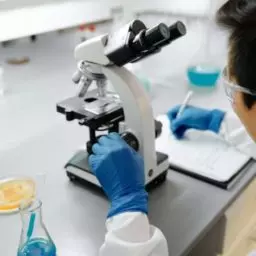
Master’s Degree in Biotechnology
Biotechnology is a science that involves the use of living systems and organisms to develop or make products that help improve our lives and the health of our planet.According to BLS, the job outlook for biochemists and biophysicists is 4% from 2019-2029. This is about as fast as the average for all occupations.
Online or In-person Master’s in Biotechnology
When it comes to getting your master’s degree in biotechnology, you can find an in-person program or an online program. The benefits of an online program may appeal to working professionals or those looking for a career transition. In-person programs may appeal more to those coming from undergraduate programs or those who simply want that in-person experience. There might be some classes that will have to be taken in person such as labs and certain tests.A Master’s in Biotechnology
Many jobs in biotechnology do require a master’s degree. And there are many options within the field, depending on what you want to do after you graduate.Those with a master’s in biotechnology can work in research for a private company, can take on a management role, or use it as a stepping stone for a doctorate.
Concentrations in Biotechnology
Different concentrations will have different types of coursework. Here are some concentrations that you might find in a master’s of Biotechnology program:- Biodefense - Students will prepare for a career in national defense, learning about topics such as bioterrorism, biowarfare, and bioethics.
- Biotechnology Science - Students will focus on topics related to biotechnology science and research, such as DNA damage and repair.
- Pharmaceutical Technologies - Students will focus on the conversion of purified proteins to drug products that are compatible with clinical use.
- Entrepreneurship - Students will learn about how to start their own life sciences firm and what that would include.
Classes in Biotechnology
The classes you take in a master’s of biotechnology program will depend on your concentration. Here are a few examples of classes you might take while getting your master’s degree.- Molecular Biology- this class teaches about DNA replication, transcription, translation, and more.
- Bioethics – this class examines ethical issues related to transplants, animal subjects, in vitro fertilization, and more.
- Cell Biology – this class focuses on cell structure and the functions of a cell.
- Physiology – this class studies the functions and mechanisms in a living system.
Admission Requirements
Admission requirements differ based on the school and program, however, most will require students to have a bachelor’s degree from an accredited school, to complete an application essay, and submit letters of recommendation. Students most likely will need to have a bachelor’s degree in biotechnology or another similar field.Some schools might also require professional experience, but even if the school doesn’t, it can help to have that work experience to put on the application. Schools usually also want students to have a 3.0 GPA or higher.
How to Choose a Program
There are many different factors when choosing the right biotechnology master’s program. Students should look at the length of each program, the course format, available concentrations, and final project requirements. Most programs are two years long, but students might also be able to find an accelerated program and be done in a year. It also might depend on if the student goes full or part-time. Students should also consider the curriculum and the cost.Accreditation status for each program can also make a difference and can affect future career opportunities. Departments often receive accreditation from field-specific accrediting bodies. Accreditation will indicate that the program meets set standards of quality for the profession.
Top 10 Master’s in Biotechnology Programs
There are many different master’s in biotechnology programs, some are in-person, and some are online.Here are 10 of the top master’s in biotechnology programs:
- Columbia University in the City of New York
- The University of Pennsylvania
- Johns Hopkins University
- Northwestern University
- Brown University
- Georgetown University
- The University of Southern California
- Carnegie Mellon University
- Tufts University
- Brandeis University
Top 10 Online Master’s in Biotechnology Programs
Here are 10 of the top online master’s in biotechnology programs:- Johns Hopkins University
- Columbia University in the City of New York
- The University of Illinois at Urbana-Champaign
- George Washington University
- Case Western Reserve University
- Husson University
- Harvard University
- The University of Maryland University College
- Purdue University
- Morehouse School of Medicine
Filters
Degree Level
Search and select multiple degree level.
Search and select multiple degree level.
Degree Program or Area of Study
Search and select multiple area of focus.
Search and select multiple area of focus.
Where do you plan to study?
Type of School
Years Offered
Campus Setting
Size of School
Gender-Specific
Religious Affiliation
Religious Affiliation
Ethnic Affiliation
Financial SupportAcademic SupportPrograms
Jobs With a Master’s Degree in Biotechnology
- Biochemist - Biochemists research to better understand the physical and chemical principles of living things and their biological processes. Annual Median Pay: $61,669.
- Industrial Production Manager - Industrial Production Managers oversee the operation of diverse manufacturing facilities. Annual Median Pay: $70,433.
- Biomanufacturing Specialist - Biomanufacturing Specialists use tools and methods to guarantee products that meet certain requirements throughout the manufacturing process. Annual Median Pay: $65,774.
- Business Development Manager - Business Development Managers provide detailed market analysis and competitive intelligence that helps biotechnology companies formulate as well as execute growth and investment strategies. Annual Median Pay: $74,450.
- Medical Scientist - Medical Scientists will conduct clinical research to help improve patient health by investigating diseases and prevention methods. Annual Median Pay: $80,448.












